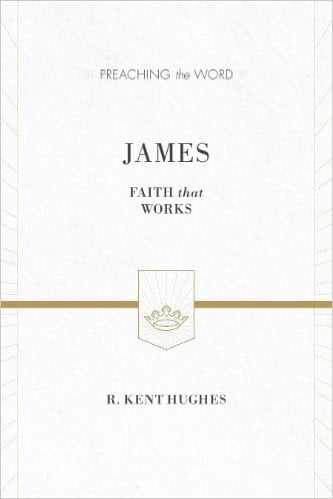⏱️ Estimated Reading Time: 4 min read
I hate to admit that I both love and hate the book of James. Okay – I know we are not supposed to hate any book of the Bible, but James addresses a plethora of life issues, many of which we struggle to place under the Lordship of Jesus. I love what James has to say about the tongue but that, of course, means I have to stop allowing my tongue to steer the ship of my life. Rooting yourself in James for a while is a good and a challenging proposition. Furthermore, having a quality commentary alongside for that journey is important.
Recently, I had the opportunity to work through the book of James for my daughter’s homeschool assignments in the Bible. Thus, having a commentary on hand was a must, in particular, one that leaned less on the scholarly side. I had the pleasure of utilizing another marvelous volume from the Preaching the Word commentary series, namely R. Kent Hughes James: Faith that Works.
If you are unfamiliar with the Preaching the Word series, they are intended as a tool for preachers who will, in turn, utilize the information to share the valuable elements of the portion of Scripture in question with their parishioners. This series is scholarly when it needs to be; however, the focus is more on helping the pastor extract from the text the elements needed for sound expository preaching and more important, application of the text.
This particular volume carries on the excellent tradition of the overall series. James is absolutely a book replete with excellent application. As Hughes saliently notes in the first chapter his commentary, “the dominant theme is faith that is real works practically in one’s life. That is, true faith is a faith that works.”
Since we live in a time when the temptation is to embrace grace to the extent that obedience and works are terms that have often become rejected, it is absolutely vital that the proper balance between faith and works is correctly exegeted. Throughout this commentary, Hughes provides that correct relationship between faith and works, noting that if we claim to have faith and if we claim to be followers of God, our lives will demonstrate faithfulness to God’s commands out of love for God’s grace. The impact of that faithfulness will be a changed life that impacts how we interact with others and for that matter, with God. It is truly where the rubber meets the road of how to love God and others.
A fine example is found in Hughes discussion on the tongue. If there is one area where we all struggle, it is in controlling the tongue. How many times are we tempted to gossip, criticize, boast, lie, and the list goes on and on and on? While sin originates in the heart, it is the tongue that lets loose much of the sinful behavior that originates from within. We curse others and bless God.
Hughes does not leave the reader wondering how to fix the problem of the tongue. This is where this type of commentary is so helpful. Hughes provides helpful application, most notably reminding the reader that we do not have to succumb to allowing this area of sin to control our lives. We can seek God’s cauterizing surgery, we can be in prayer, and we can discipline ourselves when it comes to the tongue. Yep – this involves work but after all, this if faith and works going hand in hand as God intended.
There is much to enjoy with this commentary as I have only scratched the surface in describing the valuable exegesis and application Hughes provides. James is a challenging book, one we would like to avoid but should not. Works is not something we enjoy hearing about, but if we proclaim to have faith, we had better check out what James has to say. If you are being led to explore the book of James, I highly recommend you take a look at R. Kent Hughes commentary on James. It will serve to be a helpful companion for your study.



